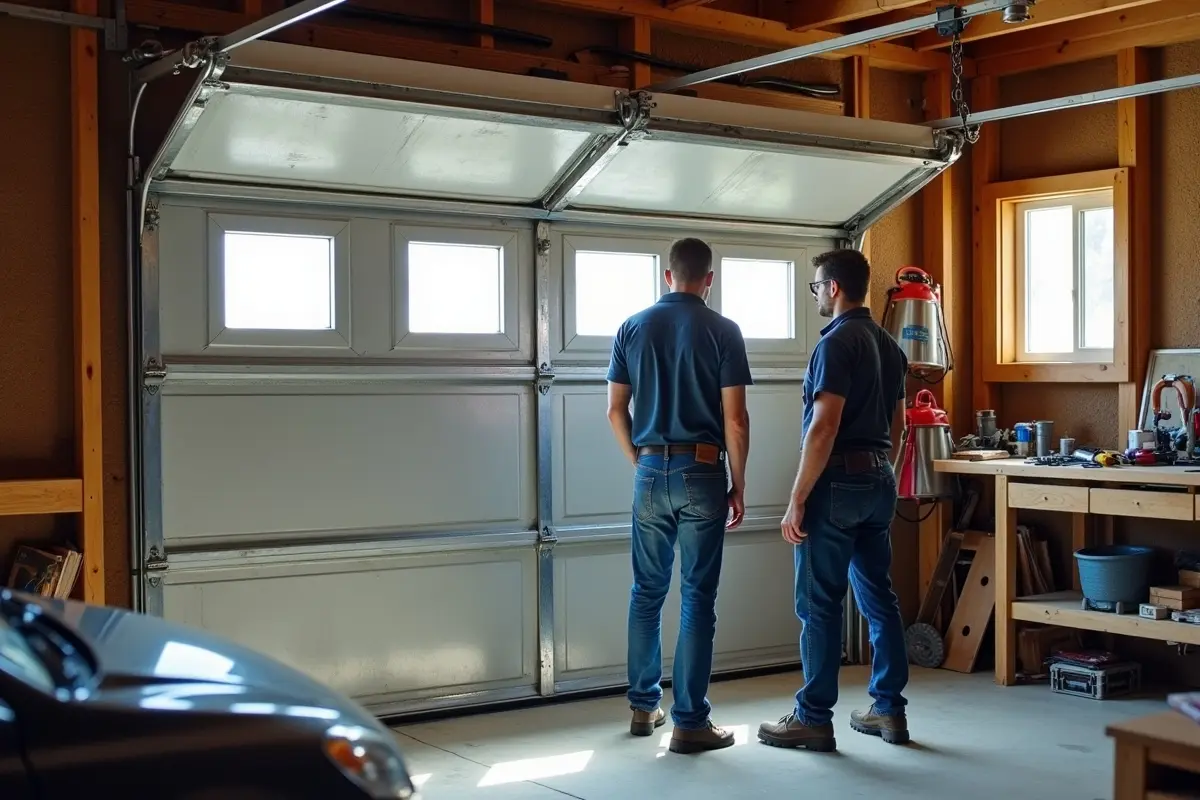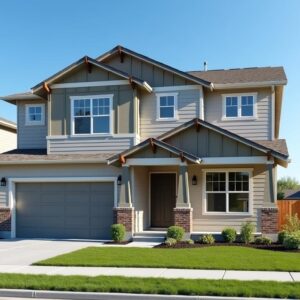A garage door is one of those things you don’t think about—until it stops working. Suddenly, your routine gets thrown off, and you’re left wondering what went wrong. Sound familiar? If so, you’re not alone. Garage doors are complex systems with moving parts that occasionally need a little attention. We’ll break down some of the most common issues and, more importantly, what you can do about them.
Contents
- 1 1. Door Won’t Open or Close
- 2 2. Door Sticks or Moves Unevenly
- 3 3. The Remote or Wall Switch Doesn’t Work
- 4 4. The Door Reverses Before Closing
- 5 5. Loud Noises During Operation
- 6 6. The Door Slams Shut
- 7 7. The Door Doesn’t Stay Open
- 8 Why Professional Help Beats DIY Every Time
- 9 Keep Your Garage Door in Top Shape
- 10 When It’s Time to Call the Experts
1. Door Won’t Open or Close
Picture this: you’re trying to leave for work or get back home, and your garage door just won’t budge. It’s a headache, and this issue happens more often than you’d think. If your door doesn’t open or close at all, the first thing to check is the power supply. Is the opener plugged in? Has a circuit breaker tripped? These simple fixes are easy to overlook but can save you a lot of frustration.
For more specific issues, like if your Chamberlain garage door won’t close all the way, the problem could be linked to the travel limits or safety sensors. Modern systems have adjustable travel settings that tell the door how far to close. If these are miscalibrated, the door may stop short of fully closing. Additionally, dirty or misaligned safety sensors can send a signal that the door needs to reverse, thinking there’s an obstacle. While cleaning or realigning the sensors might help, if the issue persists, it’s worth calling a professional. They can inspect the opener, recalibrate settings, and address any underlying problems quickly and safely.
When all else fails and your garage door opener itself seems to be the issue, it may be time to consult an expert. Motors and internal components can wear out over time, and professional repair ensures the job is done correctly, avoiding further damage.
2. Door Sticks or Moves Unevenly
A jerky, uneven garage door isn’t just inconvenient—it’s a safety hazard. This problem is often caused by damaged tracks or misaligned rollers. Dirt, debris, or rust in the tracks can also lead to sticking. Regular cleaning can help, but if you notice bent or warped tracks, it’s time to bring in an expert. Attempting to realign tracks yourself can make the problem worse, and replacing rollers requires specialized tools. Keep your garage door running smoothly by addressing these issues before they escalate.
3. The Remote or Wall Switch Doesn’t Work
If your remote or wall switch isn’t responding, it’s easy to assume the worst. But don’t panic—it could be something simple. First, check the batteries in your remote. Yes, it’s basic, but it’s often the culprit. If the remote is fine, test the wall switch. A loose wire or a burned-out circuit board could be to blame. For professional-grade repairs, an experienced technician can ensure your opener system is back to full functionality without risking damage to your electronics.
4. The Door Reverses Before Closing
Does your door start to close, then suddenly reverse? This is likely an issue with the safety sensors. These sensors are located near the floor on either side of your garage door. They’re designed to stop the door if something is in the way, like a child or a pet. If the sensors are misaligned or dirty, they can send a false signal. Gently clean the sensors with a soft cloth and check their alignment. Still having issues? Sensor replacements or adjustments are a job for a professional to avoid causing further misalignment or damage.
5. Loud Noises During Operation
Garage doors aren’t exactly whisper-quiet, but excessive noise is a red flag. Grinding, squeaking, or rattling noises usually indicate worn-out hardware. Hinges, rollers, and springs can all wear down over time. Lubricating these parts can sometimes help, but if the noise persists, it’s likely time for a replacement. It’s essential to leave spring repairs to the experts. Torsion springs, in particular, are under extreme tension and can cause serious injury if handled improperly.
6. The Door Slams Shut
If your door closes with a bang instead of a gentle glide, you’ve got a problem. This issue is often tied to broken springs or cables. Springs and cables work together to balance the weight of your garage door, ensuring smooth operation. A sudden slam means one or both of these components have failed. This is not a DIY fix. Broken springs and cables can be dangerous, so it’s critical to have them repaired or replaced by a professional who understands the risks.
7. The Door Doesn’t Stay Open
Have you noticed your door slowly creeping down after you’ve opened it? This can be frustrating and unsafe. The issue is usually due to faulty springs or an imbalanced door. Over time, the tension in the springs can weaken, making them unable to hold the door in place. Replacing or adjusting springs requires precision. A professional technician can safely balance your door and restore its proper function.
Why Professional Help Beats DIY Every Time
It’s tempting to try and fix garage door issues yourself, especially with so many “quick fix” videos online. But when it comes to something as heavy and potentially hazardous as a garage door, DIY isn’t always the smartest choice. Professionals bring expertise, tools, and safety measures that you just can’t replicate at home. Plus, they can spot problems you might not even know to look for.
Here’s why professional repairs are worth it:
- Expert diagnosis – They can quickly identify the root cause of the problem.
- Safety-first approach – Handling springs and heavy doors requires the right training.
- Durable solutions – Professionals ensure the fix is long-lasting, saving you time and money in the long run.
- Warranty protection – Many garage door companies offer guarantees on their work, giving you peace of mind.
- Comprehensive maintenance – They can inspect the entire system to catch small issues before they become big problems.
Keep Your Garage Door in Top Shape
A little maintenance goes a long way in preventing most garage door issues. Here are a few tips to keep your door running smoothly:
- Regularly inspect and clean the tracks to remove debris.
- Lubricate moving parts like hinges, rollers, and springs with a high-quality lubricant.
- Test the safety sensors periodically to ensure they’re working properly.
- Check for signs of wear and tear, such as frayed cables or rusted parts.
- Schedule an annual professional inspection to catch potential problems early.
By staying proactive, you’ll extend the life of your garage door and avoid costly repairs.
When It’s Time to Call the Experts
Garage doors are a critical part of your home, so it’s worth investing in their upkeep. Whether it’s a stubborn door that won’t budge or a noisy system that’s driving you mad, addressing issues early can save you a lot of hassle. While some problems can be managed with regular maintenance, others demand professional attention. The key is knowing when to call for help. By relying on trained technicians, you’ll ensure your garage door stays reliable, safe, and efficient for years to come.





